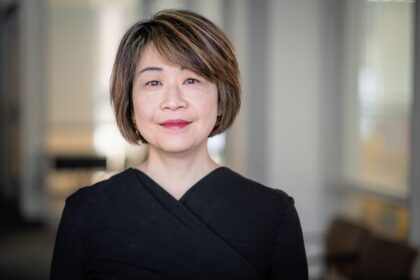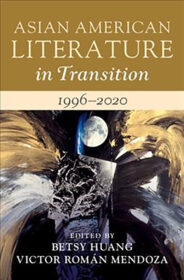New book chronicles growth and textures of Asian American literature
In just more than two decades, Asian American literature has seen remarkable growth and visibility amid a period of civil unrest and economic struggles.

Those literary advances and societal challenges are examined in “Asian American Literature in Transition, 1996-2020,” edited by Betsy Huang, associate provost and dean of the College at Clark, and Victor Roman Mendoza, associate professor of English and Women’s and Gender Studies at the University of Michigan.
The book, published in 2021 by Cambridge University Press, explores Asian American writing through numerous political, social, and historical prisms and contexts, both globally and domestically.
This is the fourth and final installment of “Asian American Literature in Transition,” a four-volume series commissioned by Cambridge University Press and compiled by series editors Rajini Srikanth and Min Hyoung Song. Previous volumes covered 1850-1930, 1930-1965, and 1965-1996. The series is an essential tool for teachers and researchers to access a broader and deeper understanding of the historical, political, and aesthetic concerns of literary works written by Asian Americans and Asians in the diaspora.
Interested in reading more?
The volumes offer a full slate of prominent scholars’ discoveries, discussions, and theories of literature by and about Asian Americans during each period, tracing forgotten texts and literary debates as well as prognostications and directions of the field for the future.
As a new wave of creative writing and scholarship by Asian Americans developed between 1996 and 2020, the accelerated literary growth is nevertheless juxtaposed with the realities of ongoing social, racial, and environmental injustices—realities that the scholars in the volume address directly and uncompromisingly.
 “The chapters here examine the ways social, economic, and environmental upheavals in the US over the past two decades and more have galvanized more nuanced productions and theorizations of Asian American literature across disciplines, geographies, and genres,” Huang and Mendoza write in the book’s introduction.
“The chapters here examine the ways social, economic, and environmental upheavals in the US over the past two decades and more have galvanized more nuanced productions and theorizations of Asian American literature across disciplines, geographies, and genres,” Huang and Mendoza write in the book’s introduction.
Huang, also an associate professor of English, researches the overlap between ethnic American and Asian American literature, as well as science fiction, gene theory, and critical race and ethnic studies.
Huang has also published “Contesting Genres in Contemporary Asian American Fiction” (2010) and has co-edited two essay collections, “Techno-Orientalism: Imagining Asia in Speculative Fiction, History, and Media” (2015) and “Diversity and Inclusion in Higher Education and Societal Contexts” (2018).


